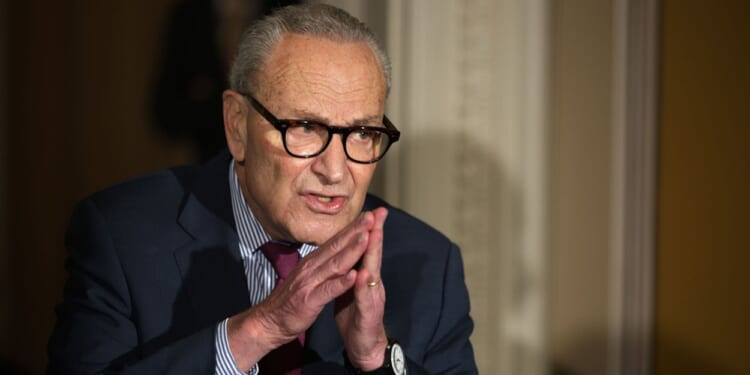The government shutdown is another step closer to coming to an end after the Senate voted in favor of a bill to fund the government.
The Senate passed a measure that would fund the entire government through Jan. 30 by a vote of 60 to 40 on Monday night. Thirty-eight Senate Democrat Caucus members, led by Minority Leader Chuck Schumer, D-N.Y., voted against the measure despite the mounting pain the longest government shutdown in U.S. history has caused. Sen. Rand Paul, R-Ky., was the only Republican to vote against the measure, while Sen. Bernie Sanders, who caucuses with the Democrats, also opposed it.
The funding stopgap measure still has to pass the House of Representatives before it could be sent to President Donald Trump for his signature. Trump has said he would sign it into law.
Some government agencies and initiatives would receive funding for the full fiscal year, including the Department of Agriculture, the Department of Veterans Affairs, the FDA, congressional operations, and construction projects for the military. The bill would bring back the thousands of furloughed federal personnel to their workplaces and compensate them for their missed paychecks.
“To millions of people, I think it’s been absolutely shocking, really a moral indictment on this body,” Sen. Josh Hawley, R-Mo., told reporters on Capitol Hill. “I’ve never seen anything like it, and it’s just stunning. So I’m glad it’s finally coming to an end, I hope.”
Sen. John Fetterman, D-Pa., told The Daily Signal that he did not know if his Democrat colleagues were disappointed by the outcome of the shutdown, but said, “there were plenty more than [sic]… beyond just the eight that wanted to vote, but … they were afraid.” The Pennsylvania Democrat noted that some of his colleagues were “monetizing off the chaos” through fundraising.
Fetterman was one of eight Senate Democrat Caucus members to break ranks and strike a deal with Senate Republican leadership. The deal that paved the way for Monday night’s vote came together on Sunday when enough Senate Democrats bucked the minority leader’s shutdown strategy and provided the support needed to overcome the Senate filibuster and procedurally advance the measure. In exchange for funding the government, Senate Democrats got a promised future vote on extending the temporarily enhanced Obamacare subsidies, which Democrats set to expire at the end of 2025 in a party line vote under President Joe Biden.
Democrats shut down the government on Oct. 1 in an attempt to use the shutdown as leverage to extend the COVID-era subsidies that were set to expire.
Many Republican senators have been critical of the subsidies that Democrats were trying to pass by using the shutdown as leverage. Critics of the subsidies claim they cost taxpayers billions of dollars but do little to lower healthcare costs.
“There’s so many problems with that additional subsidy that have been well reported,” Sen. James Lankford, R-Okla., told The Daily Signal. “We’ve got people [earning] half a million dollars a year in income, that are getting the subsidies. We’ve got areas of individuals on the lowest area that we believe don’t even know they have the coverage. There’s just money being sent to insurance companies,” Lankford said.
Sen. John Hoeven, R-N.D., attributed the high cost of health insurance to the Affordable Care Act, noting that Congress was going to have to make some “key reforms that go at the cost problem.”
“Obamacare is what’s driving up costs. Got to make some changes that are going to address that,” Hoeven said. When asked by The Daily Signal if Democrats would be a part of the efforts to fix the high cost of health insurance Hoeven said, “Ideally, we want a big bipartisan majority to get the kind of reform that you know, we can support.”
As the Senate was voting, Senate Republicans discussed the politics surrounding extending the subsidies. Sen. Thom Tillis, R-N.C., told The Daily Signal that he did not expect the subsidies to be extended for only one year.
“I don’t think you’ll see a straight one year extension, because does anybody really want to go through this drama next year during an election cycle? I mean, I’m not up for election, but that just makes no political sense to me, that you do a simple extension, same narrative next year,” the retiring North Carolina senator explained.
Tillis, who has signaled he is open to extending the subsidies with certain fixes, emphasized the cost increases that would be hitting Americans as a result of the subsidies expiring.
“I mean, you have to give people time to react, and this sort of cold turkey that people are going through now they couldn’t possibly plan for some of these increases. Some are going up just because insurance rates are going up. Some are going up because the subsidies are going away, and creating that huge gap is going to make it very difficult for people,” the North Carolina senator said.
Senate Minority Whip Dick Durbin, D-Ill., promised to continue to fight for the ACA subsidies, stating, “The future is unpredictable, but we need to continue our fight unequivocally, unyieldingly, for affordable health care insurance through extending the subsidies and other measures under the ACA.”
Sen. Markwayne Mullin, R-Okla., weighed in on how the White House was feeling. He said Trump had been active in the process of ironing out a deal letting the congressional leadership negotiate the details but remaining “very engaged.” Mullin also mentioned a potential policy that could alleviate the high cost of health insurance.
“I think the President has made a great argument to the American people by saying, ‘Hey, instead of giving insurance companies this subsidy that they’re wanting, why don’t we vote on it and give it to the American people?’” Mullin said.















